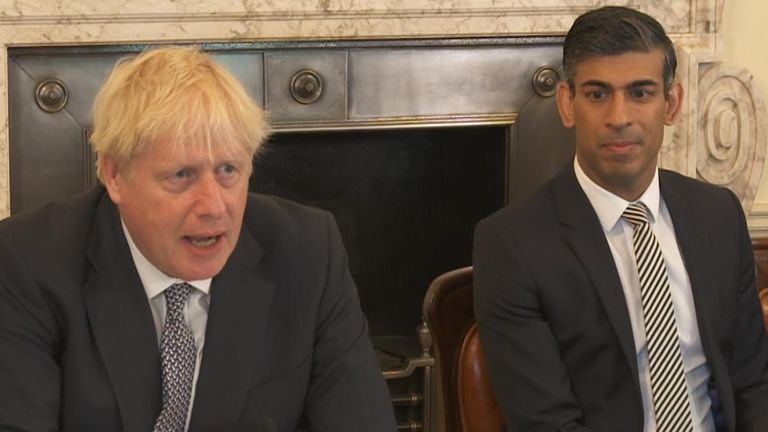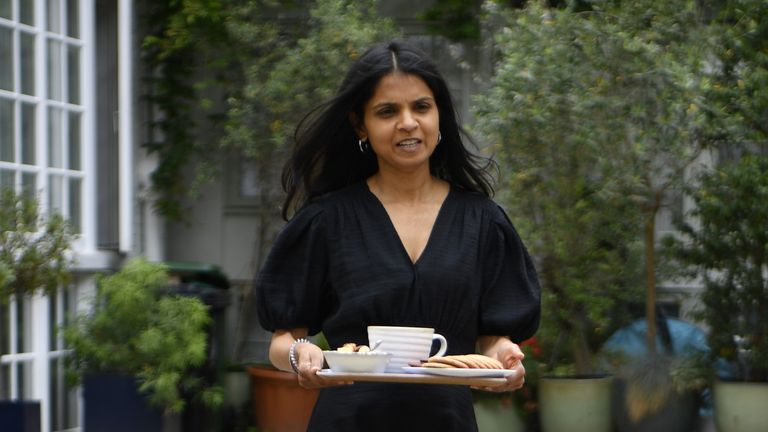Rishi Sunak in profile: From relative unknown to household name (original) (raw)
Rishi Sunak became the youngest prime minister of the modern era when he took over the Conservative Party back in 2022.
As we head towards the next election on 4 July, we take a look at how the Tory leader reached his position in politics and got the keys to Number 10.
First-class Oxford degree
Born in 1980 in Southampton, he is the eldest of three children to his parents of Punjabi descent.
Mr Sunak's father was a family doctor and his mother ran a pharmacy, where he helped her with the books.
He attended England's oldest public school, Winchester College, where he became the first Indian-origin head boy and was editor of the school paper.
He has since said his experience at the boarding school was "intellectually transforming" and put him "on a different trajectory".
Mr Sunak went on to study philosophy, politics and economics at Lincoln College at Oxford University, where he obtained a first-class degree.
After completing an MBA at Stanford University, where he met his future wife, Akshata Murthy, Mr Sunak worked for the investment bank Goldman Sachs as an analyst.
He was said to have already had job offers from investment banks under his belt while still in his second year at Oxford.
He moved to work for hedge funds in 2006 when he joined TCI, known as a very aggressive fund, and left three years later to cofound a new hedge fund.
Mr Sunak then turned his attention to politics.
Please use Chrome browser for a more accessible video player
Ed Conway takes a first look at the Conservative Party manifesto.
Replacing a Tory grandee
In 2014, Mr Sunak was selected as the Conservative Party candidate in the Yorkshire seat of Richmond - previously held by former Tory leader William Hague - before the following year's general election.
Nicknamed the "maharajah of the Yorkshire Dales", he recalled being introduced as "the new William Hague" to his constituents after winning the ballot, to which a Yorkshire farmer replied: "Ah yes Haguey!
"Good bloke. I like him. Bit pale, though. This one's got a nice tan."
Soon after his entry into the Commons - where, as a Hindu, he took his oath on the Bhagavad Gita - the first big political fight of his career came over Brexit.

Image: Mr Sunak backed Boris Johnson after Theresa May's downfall over Brexit
Mr Sunak supported leaving the EU, claiming the UK would be "freer, fairer and more prosperous" outside the bloc.
His side won, and he bided his time on the backbenches, supporting Theresa May's negotiations and writing papers on the benefits of freeports, before being appointed to government in January 2018 as a junior minister at the housing department.
After Mrs May's demise, he joined with colleagues Oliver Dowden and Robert Jenrick to write an article in The Telegraph, backing Boris Johnson as the only person who could "save" the Tory party.
His support paid off, as when Mr Johnson became prime minister in July 2019, Mr Sunak secured a promotion to become chief secretary to the Treasury, and the right-hand man to Sajid Javid as chancellor.
It was the exit of that boss that led to his real rise to prominence when he was made chancellor in February 2020 - a month before COVID took hold.
From relative unknown to household name
Mr Sunak won praise throughout the pandemic for rapidly introducing support schemes worth billions of pounds to keep jobs and businesses afloat during 18 months of lockdowns.
The likes of furlough and the "Eat Out to Help Out" scheme led to "dishy Rishi" becoming a household name, and a popular one with the public.
At the height of this popularity, he was seen by many Tory MPs as the sure-fire favourite to succeed Mr Johnson when the time came.

Image: The then-chancellor's Eat Out to Help Out plan made him a household name
But he seemed to fall from grace as quickly as he rose to fame.
Mr Sunak introduced a number of policies that went down badly with Tory MPs, especially the rise in national insurance to fund more money for the NHS and social care.
He was also fined for attending the prime minister's birthday party during COVID restrictions in 2020, compromising his ability to separate himself from the partygate scandal.
But it was revelations about his wife that really damaged his standing with the public.
Wife's non-dom status hits leadership hopes
Ms Murty is a multimillionaire and daughter of billionaire NR Narayana Murthy, the co-founder of the Indian technology giant Infosys.
In April 2022 it was revealed she held non-dom status, meaning she did not have to pay UK tax on her sizeable international income, and it led to an uproar.

Image: Akshata Murthy's tax affairs brought his position as chancellor into question
She later confirmed she would begin to pay tax on her international earnings as it had "become clear that many do not feel [the non-dom status] is compatible with my husband's role as chancellor".
The row led to opposition parties highlighting his family's wealth, with Mr Sunak facing accusations his personal circumstances made him an unsuitable candidate to take over and tackle the cost of living crisis.
Although he remained as chancellor, many wrote off his chances of becoming the next Tory leader.
But his resignation in July sparked a ministerial exodus and Mr Johnson's resignation as PM, paving the way for his first attempt at Downing Street.
Please use Chrome browser for a more accessible video player
October 2022: What do voters make of 'PM Sunak'?
In the ensuing leadership race, Mr Sunak came out on top in each of the five parliamentary rounds of the contest, making it to the final two along with Liz Truss, who was foreign secretary in Mr Johnson's government.
But as the campaign hit its stride and widened to the party membership, Mr Sunak found himself transformed from favourite to underdog.
While he warned of "tough choices ahead" to tackle record levels of national debt incurred during the pandemic, Ms Truss promised tax cuts as a priority.
He accused his competitor of "fairy-tale" economics and peddling "something-for-nothing" plans that even former Labour leader Jeremy Corbyn would baulk at.
But Ms Truss doubled down, landing blows on Mr Sunak for putting taxes up to the highest level in 70 years.
Please use Chrome browser for a more accessible video player
Sky's economics editor Ed Conway looks at what factors may have prompted Rishi Sunak to call a general election on 4 July.
Staying in the background
She went on to win the party leadership after securing 57% of the vote, compared to 43% for Mr Sunak.
While Ms Truss embarked on a path of economic turmoil thanks to her tax-slashing mini-budget, the former chancellor kept a low profile, only appearing in the Commons for a few backbench debates and staying away from the cameras.
And after her resignation following a historically short tenure, all eyes were back on Mr Sunak as the candidate to bring back stability to the markets and, perhaps, the party.
He announced he was running to replace Ms Truss on Twitter three days later, having already reached the 100+ nominations needed to get a place on the ballot.
But that was all we saw of the favourite for PM as he again kept out of the spotlight, despite going for the highest profile job in the land.
X This content is provided by X, which may be using cookies and other technologies. To show you this content, we need your permission to use cookies. You can use the buttons below to amend your preferences to enable X cookies or to allow those cookies just once. You can change your settings at any time via the Privacy Options. Unfortunately we have been unable to verify if you have consented to X cookies. To view this content you can use the button below to allow X cookies for this session only.
Up until two minutes before the deadline for nominations, it looked like Mr Sunak would be facing Penny Mordaunt - another former leadership contestant who fancied her chances again.
But she pulled out of the race at the last minute and so, instead, he was anointed as both leader and prime minister without challenge - the first Hindu and British Asian to reach the position in UK history.
Rocky premiership
Standing on the steps of Downing Street, the new prime minister promised a government of "integrity, professionalism and accountability" as he attempted to break away from the chaos of his predecessors.
But his tenure in office has brought its own challenges - and a steady decline in both his and his party's popularity.
The first few months of his premiership saw a raft of scandals and resignations, with both Sir Gavin Williamson and Dominic Raab quitting amid bullying allegations, and Nadhim Zahawi exiting over his tax affairs.
Mr Sunak attempted to steady the ship come January 2023 by setting out his vision through "five priorities" for government.
His pledge to half the record inflation figure was achieved by the end of the year - though debate remains over whether that was through the work of the government or the markets.
But the jury remains out on his two other economic promises - reducing debt and growing the economy.
Please use Chrome browser for a more accessible video player
Sky's economics editor Ed Conway looks at what factors may have prompted Rishi Sunak to call a general election on 4 July.
Cutting NHS waiting lists hasn't gone to plan either, with the numbers still sitting above 7.5 million, and relations with the sector remain rocky as junior doctors continue to strike over pay and conditions.
It is perhaps his final pledge, however, that has become the flagship of his premiership - "stop the boats".
Mr Sunak adopted the Johnson-era policy to deport asylum seekers to Rwanda in an attempt to deter further Channel crossings, but it has continued to cause him problems, from the UK's Supreme Court ruling it unlawful through to rebellions on his backbenches calling for tougher measures - he even lost some ministers over it.
But it remains front and centre of his agenda as he heads into the next general election after the passage of the Safety of Rwanda Act despite extensive wrangling with the House of Lords.
Calling an election
On Wednesday 22 May at 7am, figures showed inflation in the UK had fallen to 2.3% - close to the Bank of England's 2% target.
Within hours, rumours started to swirl that Mr Sunak was set to make an announcement outside Downing Street.
Spreaker This content is provided by Spreaker, which may be using cookies and other technologies. To show you this content, we need your permission to use cookies. You can use the buttons below to amend your preferences to enable Spreaker cookies or to allow those cookies just once. You can change your settings at any time via the Privacy Options. Unfortunately we have been unable to verify if you have consented to Spreaker cookies. To view this content you can use the button below to allow Spreaker cookies for this session only.
👉 Listen above then tap here to follow the Sky News Daily wherever you get your podcasts 👈
And then shortly after 5pm, the prime minister announced a general election would be taking place on 4 July.
Rishi Sunak had fired the starting gun on the election that had to be called by the end of the year - going earlier than some people expected, including some within his own party.
Sir Keir Starmer responded shortly afterwards, and soon all the parties entered campaign mode with their sights set on the start of July.